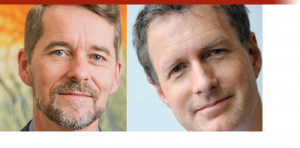Subscribe: Spotify | RSS | More

Jim talks with Morten Christiansen and Nick Chater about their new book The Language Game: How Improvisation Created Language and Changed the World. They discuss the game of charades & its relevance to the evolution of language, the false myth of a pure language, language as self-organizing system, Captain Cook’s encounter with indigenous South Americans, pidgins & creoles, gesture & vocalization, language & tool construction, the communication iceberg metaphor, misunderstandings in relationships, the now-or-never bottleneck, language understanding vs language production, genetic capacity for sequence-action-sequence tasks, chaotic improvisation as the core, the complaint that the young are ruining the language, the unbearable lightness of meaning, the miracle of sloppiness, order & disorder, word order & frozen accidents, language evolution without biological evolution, ChatGPT as a demonstration of how far learning from experience can get you, a poetry Turing test, and much more.
The Language Game has been featured on Behavioral Scientist’s Notable Books of 2022. Morten and Nick’s previous co-authored book Creating Language: Integrating Evolution, Acquisition, and Processing (MIT Press 2016) was named the Choice Outstanding Academic Title in 2017.
- Episode Transcript
- JRS EP75 – Nick Chater: “The Mind Is Flat”
- The Language Game: How Improvisation Created Language and Changed the World, by Morten Christiansen & Nick Chater
- Simpler Syntax, by Peter Culicover & Ray Jackendoff
- Syntactic Nuts: Hard Cases, Syntactic Theory, and Language Acquisition, by Peter W. Culicover
Morten H. Christiansen is the William R. Kenan, Jr. Professor of Psychology at Cornell University, Professor in Cognitive Science of Language at the School of Communication and Culture and the Interacting Minds Centre at Aarhus University, Denmark, as well as a Senior Scientist at the Haskins Labs. His research focuses on the interaction of biological and environmental constraints in the evolution, acquisition and processing of language. He was awarded the Cognitive Psychology Section Award from the British Psychological Society in 2013 and a Charles A. Ryskamp Research Fellowship from the American Council of Learned Societies in 2006. Christiansen was elected as a foreign member of the Royal Danish Academy of Sciences and Letters and of the Royal Norwegian Society of Sciences and Letters, as well as elected Fellow of the Association for Psychological Science and of the Cognitive Science Society. Christiansen is the author of over 250 scientific papers and has edited four books and authored two monographs.
Nick Chater is a Professor of Behavioral Science at Warwick Business School. His research focuses on the cognitive and social foundations of rationality, with applications to business and public policy. He has (co-)written more than two hundred research papers and six books. His research has won awards including the British Psychological Society’s Spearman Medal (1996); the Experimental Psychology Society Prize (1997); and the Cognitive Science Society’s life-time achievement award, the David E Rumelhart Prize (to be awarded in 2023). His book, The Mind is Flat, won the American Association of Publishers PROSE Award in 2019, for Best book in Clinical Psychology. Nick is a fellow of the British Academy, the Cognitive Science Society and the Association for Psychological Science. He is a co-founder of the research consultancy Decision Technology; has served on the advisory board of the Behavioural Insight Team (popularly known as the ‘Nudge Unit’); and been a member of the UK government’s Climate Change Committee. He co-created, and was resident scientist on, eight series of the BBC Radio 4 show The Human Zoo.
